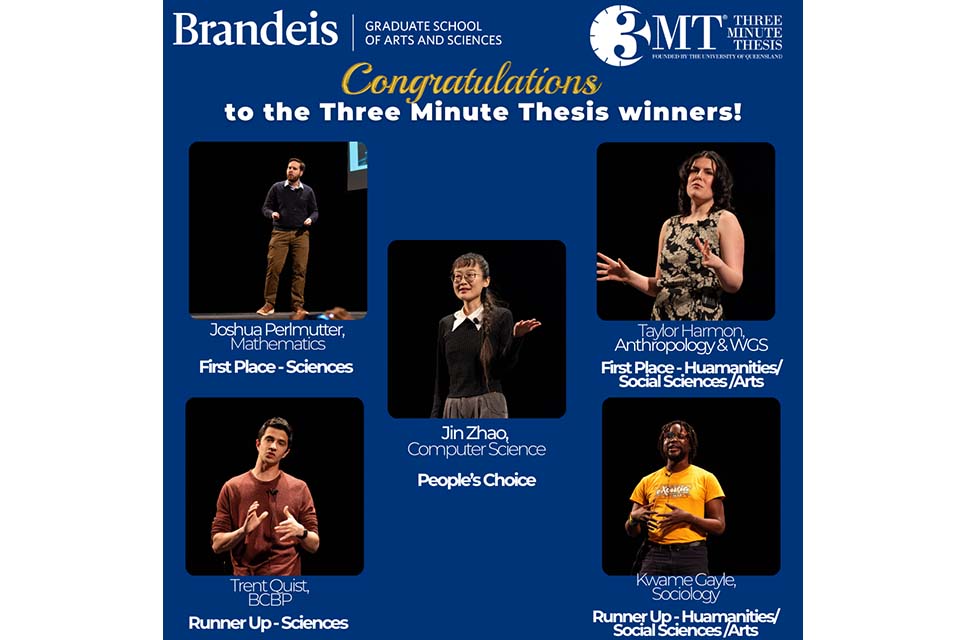Three Minute Thesis (3MT)

Photo Credit: Gaelen Morse
Three Minute Thesis Competition
The annual Brandeis Three Minute Thesis (3MT) Competition challenges students to effectively explain their research to a broad audience in just three minutes while using one slide. Hone your public speaking skills, connect with other graduate students, and potentially win up to $1,000!
For the 2026 competition, the preliminary round will be held on Monday, March 16, 2026, and the final competition will be held on Friday, March 27, 2026.
There will be two 3MT prep workshops open to all contestants, "Structuring a 3MT Talk and Creating a Slide" on February 24 from 3:30 to 4:30 and "3MT Speed Reviews" on March 5 from 1 to 2.
2026 Prizes
- First Place: $1000
- Second Place: $750
- Third Place: $500
- People's Choice Award: $500
Why Participate in 3MT?
In addition to winning prizes, students participate in 3MT to:
- Hone presentation skills
- Practice expressing research concisely for networking and job interviews (for academia and beyond)
- Figure out their research story, which is important for completing their dissertations and for their future job searches
- Add 3MT to their resume or CV, which shows important communication skills that employers are looking for in applications
- Meet other graduate students across disciplines at Brandeis
- Share their work and its impact with a wider audience
Past 3MT participants say...
“You have to push yourself pretty hard to be able to condense your research down. But being able to then present my research to my family and have them say, ‘We finally understand what you’re doing,’ where they can understand the importance of it…that was huge.”--Victoria Khaghani, (MA, Anthropology), Social Sciences, Humanities and Creative Arts Winner ‘24
“3MT was a major factor in getting multiple interviews and ultimately landing my current job, even though I had less experience than other candidates. They told me that I was a natural storyteller and that they wanted me to lead their analysts in developing data presentation skills, among other goals. I had no idea how much 3MT would shape my job search or help me secure a leadership role.”--Liz Mahon (PhD Psychology), Winner ‘23
“During an internship interview I was asked to explain my research in one minute each to three different ‘pretend’ audiences: as if I was speaking to a fellow scientist, a family member/friend, and a potential investor. Preparing for 3MT prepared me to do each of these one-minute summaries as I had already practiced thinking about how to explain my research in a manner that was approachable to non-scientists and being clear on what the point/impact of my research was.”--Camille Sullivan (PhD Molecular and Cell Biology), Finalist ‘25
“Throughout the job search, 3MT was definitely instrumental. For most interviews, you need to give an elevator pitch of your research, so having that down was very useful. I’ve also found it useful in research – the core of my argument in my dissertation became very clear to me after thinking about it for so long and needing to compress it into three minutes, so that helps whenever I’m writing and need to communicate my argument succinctly. My experience with 3MT really improved my ability to articulate my contribution to the field and how I am innovating.”--Emiliano Gutierrez Popoca (PhD English), Winner ‘22
“After going through the 3MT writing process, I no longer get nervous about the inevitable ‘What kind of math do you study?’ question now that I have a succinct and refined answer.”--Joshua Perlmutter (PhD Math), Winner ‘25
“What made this experience meaningful wasn’t just writing the script or presenting on stage. It was the process of finding language that makes complex work feel human. My favorite part was watching other researchers from wildly different fields do the same, and realizing that passion, not jargon, is what brings ideas to life.”--Jin Zhao (PhD Computer Science), People's Choice Award Winner ‘25
Articles About Brandeis 3MT Competition
- 3MT Finalists Prepare to Compete in the Last Round (2022)
- Six Students Take Home Prizes After 3MT Finals (2022)
- PhD Candidate in English Wins Regional 3MT Competition (2022)
- English PhD Candidate Emiliano Gutierrez Popoca Discusses His Journey to the National 3MT Competition (2023)
- Students Across Divisions Win Prizes and Build Skills in 2023 3MT Finals (2023)
- Liz Mahon Wins 3MT Regionals (2023)
- Brandeis Three Minute Thesis Winner Liz Mahon Journeys to Nationals (2024)
- Graduate Students Shine in 2024 Three Minute Thesis Competition (2024)
- Three Minute Thesis Leads Liz Mahon, PhD '25, to Career Success (2025)
- In 2025 Three Minute Thesis Competion, Students Bring Research to Wide Audience With Concision and Flair (2025)
- Emiliano Gutierrez Popoca, PhD '23 in English, Uses Brandeis Experience to Bring Interdisciplinarity to Work (2025)





